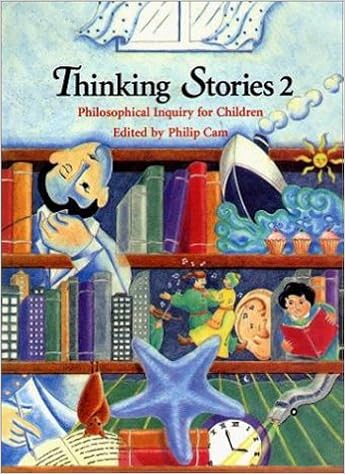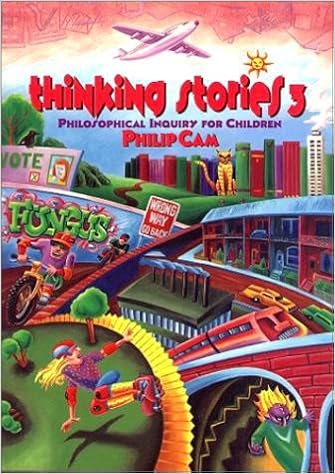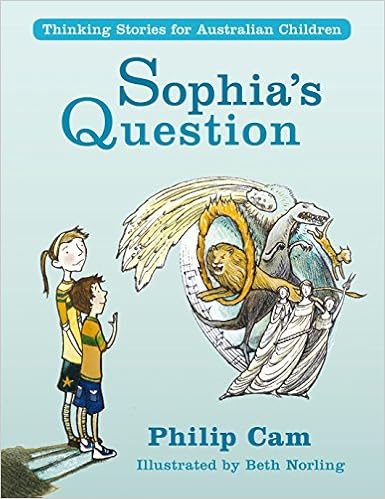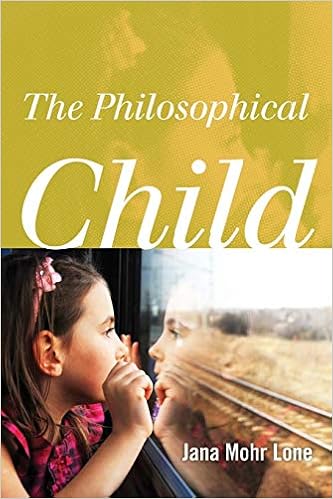Education - Philosophy for Children
Doucette Library Resources
- Searching
- P4C Materials - Books
- P4C Materials - Kits
- Books - About P4C
- Journal Articles - P4C Research
Use the catalogue with these search terms and use the filters on the left side (or on the bottom of the mobile app) to find materials located in the Doucette Library.
1. About philosophical inquiry in education - Use these search terms:
- "philosophy for children"
- philosophy AND (education OR "study and teaching")
Limit by Library -> Doucette - "thought and thinking" AND (education OR "study and teaching")
2. Books to use for philosophical inquiry with children (P4C practice) :
- Locate a title on one of the sites listed on the 'P4C Materials' tab
Use the catalogue to search for the specific title. Limit results to Item Type -> Book, Library -> Doucette - Look at books and links from our Doucette Library Pinterest boards. The boards are organized by subject and they have links to the location information.
 https://www.pinterest.ca/tflander/
https://www.pinterest.ca/tflander/
3. Kits to use for philosophical inquiry with children (P4C practice):
- The best way to discover kits is to browse the Doucette Library collection in person
Kits in the 500-599 are topics related to pure science like magnetism, animals, chemistry, etc.
Kits in the 600-699 are topics related to technology including farming, robotics, human body, etc.
Kits in the 700-799 are topics related to art, recreation, games, music - The' P4C Materials - Kits' tab has some examples.
- Search the catalogue using general phrases and limit items to Library -> Doucette and Item Type ->Other
These filters are most helpful:
- Library -> Doucette Library
- Item Type -> Books OR Item Type -> Other (for kits!)
- Location -> Picture Books
-
Centre for Philosophy for Children - University of WashingtonThis is a listing of picture books to use with P4C. Books are described with suggested guiding questions.
-
Teaching Children PhilosophyThis organization is linked to Thomas Wartenberg. It has a large list of book titles to use with P4C. Each title has a module for instruction with a listing of philosophical guiding questions.
-
Harry Stottlemeier's Discovery by Matthew Lipman
Call Number: 102.4 LIH 1982ISBN: 0916834069Publication Date: 1982-01-01One day Harry finds himself giving the wrong answer in science class and begins to wonder where he has gone wrong. This reflection soon involves his classmates, who begin to think together about the nature of thinking, inquiry and knowledge. With the help of their teacher, Harry and his classmates discover rules of formal and informal logic, relational logic and hypothetical thinking—-not as ends in themselves, but as tools in helping them understand themselves and their world.
HARRY STOTTLEMEIR’S DISCOVERY was the first novel published in Philosophy for Children, and its connection with the tradition of Western philosophy is often strong.
Grade Range: 4-7 -
-
 Writing How and Why
by
Matthew Lipman; Ann M. Sharp
Call Number: 102.4 LIS TISBN: 091683414XPublication Date: 1980-11-01
Writing How and Why
by
Matthew Lipman; Ann M. Sharp
Call Number: 102.4 LIS TISBN: 091683414XPublication Date: 1980-11-01 -
A Sneetch Is a Sneetch and Other Philosophical Discoveries by Thomas E. Wartenberg
Call Number: eBookISBN: 9781118545201Publication Date: 2013-02-21Taking Picture Books Seriously: What can we learn about philosophy through children's books? This warm and charming volume casts a spell on adult readers as it unveils the surprisingly profound philosophical wisdom contained in children's picture books, from Dr Seuss's Sneetches to William Steig's Shrek!. With a light touch and good humor, Wartenberg discusses the philosophical ideas in these classic stories, and provides parents with a practical starting point for discussing philosophical issues with their children. Accessible and multi-layered, it answers questions like, Is it okay for adults to deceive kids? What's the difference between saying the Mona Lisa is a great painting and vanilla is your favorite flavor? Each chapter includes illustrations commissioned especially for this book. -
Thinking Stories 1 by Philip Cam (Editor)
ISBN: 9780868064826Publication Date: 1998-04-01A collection of eight stories from all over the world which help children explore the process of philosophical inquiry. -
 Thinking Stories 2: Philosophical Inquiry for Children
by
Philip Cam
ISBN: 9780868065090Publication Date: 1994A collection of eleven stories exploring issues such as friendship, multiculturalism, magic and make-believe, freedom and rights.
Thinking Stories 2: Philosophical Inquiry for Children
by
Philip Cam
ISBN: 9780868065090Publication Date: 1994A collection of eleven stories exploring issues such as friendship, multiculturalism, magic and make-believe, freedom and rights. -
 Thinking Stories 3: Philosophical Inquiry for Children
by
Philip Cam
ISBN: 9780868066325Publication Date: 1997A collection of stories raising ethical and social issues set in an urban Australian community.
Thinking Stories 3: Philosophical Inquiry for Children
by
Philip Cam
ISBN: 9780868066325Publication Date: 1997A collection of stories raising ethical and social issues set in an urban Australian community. -
 Sophia's Question: Thinking Stories for Australian Children
by
Philip Cam
ISBN: 9780868067186Publication Date: 2011Sophia's Question is a story of self-discovery. Sophia is given an old bracelet and is told to ask her grandmother about its three mysterious charms. So begins a journey in which Sophia attempts to discover what turns out to be a family secret, a secret upon which her very existence depends. Driven by a strong desire for self-determination, Sophia is searching for identity. This philosophical novel is a starting point for moral inquiry. Accompanied by a Teacher Resource Book, Sophia's Question is designed to help the teacher or parent develop inquiring young readers and shows them how to use questioning, justification, conceptual exploration and reasoning to explore issues and ideas.
Sophia's Question: Thinking Stories for Australian Children
by
Philip Cam
ISBN: 9780868067186Publication Date: 2011Sophia's Question is a story of self-discovery. Sophia is given an old bracelet and is told to ask her grandmother about its three mysterious charms. So begins a journey in which Sophia attempts to discover what turns out to be a family secret, a secret upon which her very existence depends. Driven by a strong desire for self-determination, Sophia is searching for identity. This philosophical novel is a starting point for moral inquiry. Accompanied by a Teacher Resource Book, Sophia's Question is designed to help the teacher or parent develop inquiring young readers and shows them how to use questioning, justification, conceptual exploration and reasoning to explore issues and ideas. -
 Sophia's Question : Teacher Resource Book
by
Philip Cam
ISBN: 9780868067179Publication Date: 2011The Sophia's Question: Teacher Resource Book is designed to help the teacher develop an inquiring classroom community, in which students use questioning, justification, conceptual exploration and reasoning to explore issues and ideas together. To assist in this process, the Teacher Resource Book contains explanatory notes, discussion plans, exercises and activities that teachers can use to help students explore the many significant and thought-provoking topics that will arise when working with Sophia's Question.
Sophia's Question : Teacher Resource Book
by
Philip Cam
ISBN: 9780868067179Publication Date: 2011The Sophia's Question: Teacher Resource Book is designed to help the teacher develop an inquiring classroom community, in which students use questioning, justification, conceptual exploration and reasoning to explore issues and ideas together. To assist in this process, the Teacher Resource Book contains explanatory notes, discussion plans, exercises and activities that teachers can use to help students explore the many significant and thought-provoking topics that will arise when working with Sophia's Question.
This is the companion book to Sophia's Question: Thinking Stories for Australian Children
Suggestion 1
 I-glasses a compound eye simulation
I-glasses a compound eye simulation
Call Number: 591.44 IG 2000 A/V Location: Doucette Library Main collection
Animal eye viewers
Call Number: 591.44 AN 2012 A/V Location: Doucette Library Main collection
Insect specimen mounts
Call Number: 595.7 INS 2005 A/V Location: Doucette Library Main collection
Some possible philosophical inquiry questions:
Are bugs scary? If you could see through the eyes of a bug, would you find bugs scary? Does learning about something make it less scary? Can you really know what it’s like to see the world like a bug or what it’s like to be a bug?
Suggestion 2
 American bison skull replica
American bison skull replica
Call Number: 599.643 AME 2018 A/V Location: Doucette Library Main collection
Red Fox skull replica
Call Number: 599.775 RED 2014 A/V Location: Doucette Library Main collection
Animal claw replicas
Call Number: 599.47 AN 2007 A/V Location: Doucette Library Main collection
Some possible philosophical inquiry questions:
Are predators necessarily bad? Can prey be bad? Are humans predators? Are humans bad? What makes something food?
Suggestion 3
 Copper optical illusion spinner
Copper optical illusion spinner
Call Number: 535 CO 2005 A/V Location: Doucette Library Main collection
The original reversible magenetic sand timer
Call Number: 535 CO 2005 A/V Location: Doucette Library Main collection
Some possible philosophical inquiry questions:
Does seeing something make it real? If something is invisible (e.g. a magnetic field), does it mean it isn’t real? Can you trust your senses? What constitutes proof?
Suggestion 4
 Littlecodr: teaching kids to think differently
Littlecodr: teaching kids to think differently
Call Number: 794.8 Lit 2015 A/V Location: Doucette Library Main collection
EZ-Robot: JD Humanoid
Ask at Doucette Library main desk for borrowing policy
Some possible philosophical inquiry questions:
Is artificial intelligence actual intelligence? Are thoughts like algorithms? Do robots think? Are humans biological robots?
Suggestion 5
 Bottlecap monkey
Bottlecap monkey
Call Number: 731 BO 2006 REALIA Location: Doucette Library Main collection
Recycled art portfolio prints
Call Number: 745 RE 1997 A/V Location: Doucette Library Main collection
Some possible philosophical inquiry questions:
Can garbage be art? Can art be garbage? What makes something trash? Can ugly things be beautiful? What is art? What is beauty? How are they related?
-
Big Ideas for Little Kids by Thomas E. Wartenberg
Call Number: 107 WaB 2014ISBN: 147580444XPublication Date: 2014-05-01Big Ideas for Little Kids includes everything a teacher, a parent, or a college student needs to teach philosophy to elementary school children from picture books. Written in a clear and accessible style, the book explains why it is important to allow young children access to philosophy during primary-school education. Wartenberg also gives advice on how to construct a "learner-centered" classroom, in which children discuss philosophical issues with one another as they respond to open-ended questions by saying whether they agree or disagree with what others have said. -
A Teacher's Guide to Philosophy for Children by Keith J. Topping; Steven Trickey; Paul Cleghorn
Call Number: eBook & 307.152 ToT 2019ISBN: 1138393274Publication Date: 2019-06-26A Teacher's Guide to Philosophy for Childrenprovides educators with the process and structures to engage children in inquiring as a group into 'big' moral, ethical and spiritual questions, while also considering curricular necessities and the demands of national and local standards. Based on the actual experiences of educators in diverse and global classroom contexts, this comprehensive guide gives you the tools you need to introduce philosophical thinking into your classroom, curriculum and beyond. Drawing on research-based educational and psychological models, this book highlights the advantages gained by students who regularly participate in philosophical discussion: from building cognitive and social/emotional development, to becoming more informed citizens. Helpful tools and supplementary online resources offer additional frameworks for supporting and sustaining a higher level of thinking and problem-solving among your students. This practical guide is essential reading for teachers, coaches and anyone wondering how you can effectively teach philosophy in your classroom. s practical guide is essential reading for teachers, coaches and anyone wondering how you can effectively teach philosophy in your classroom. -
 The Philosophical Child
by
Jana Mohr Lone
Call Number: Full Text OnlineISBN: 9781442217348Publication Date: 2012Many parents welcome the idea of being able to talk with their children about life's big questions, but are unsure where to begin. In The Philosophical Child, Mohr Lone offers parents easy ways to introduce philosophical questions to their children and to gently help them explore significant issues.
The Philosophical Child
by
Jana Mohr Lone
Call Number: Full Text OnlineISBN: 9781442217348Publication Date: 2012Many parents welcome the idea of being able to talk with their children about life's big questions, but are unsure where to begin. In The Philosophical Child, Mohr Lone offers parents easy ways to introduce philosophical questions to their children and to gently help them explore significant issues. -
Places for Thinking by Francesca Partridge, Franck Dubuc, Laurance Splitter, Tim Sprod
ISBN: 086431292XPublication Date: 1999Accompanying a series of visually and verbally challenging books for children, this manual provides teachers and parents with discussion plans, exercises and activities to guide children in an investigation of the philosophical ideas emerging from the storybooks.
-
Philosophy for Children - Stanford Encyclopedia of PhilosophyThis is a good article to introduce you to the P4C literature. Use the Bibliography from this article to find additional articles. Articles from this resource are updated regularly and entries are peer reviewed.
Databases to Try
- ERIC
- Academic Search Complete
- Philosopher's Index
- Phil Papers
Search Terms to Use
For general searches, try the following keywords:
- “philosophy for children” OR “philosophy with children” OR p4c OR pfc OR “philosophy education”
You can also try:
- "thought and thinking"
- "study and teaching"
For more specific searches, try the above keywords and include additional concepts as needed. For example, to search for philosophy for children in elementary schools, you might try:
- “philosophy for children” OR “philosophy with children” OR p4c OR pfc OR “philosophy education”
AND
“elementary school” OR “primary school” OR “grade school” OR “early childhood” OR preschool
SOME RESEARCH TOPICS OF POSSIBLE INTEREST & SAMPLE PAPERS
Studies and Papers on the Benefits of P4C Programming:
Vocabulary and comprehension
- (De Rivera, Girolametto, Greenberg, & Weitzman, 2005; Dyfed County Council, 1994; Fields, 1995; Haas, 1980; Lipman, Sharp, Oscanyan, 1977; Wartenberg, 2009; Williams, 1993)
Oration and Articulation
- (Dyfed County Council, 1994; Lipman, Sharp, Oscanyan, 1977; Siddiqui, Gorard, & See, 2017; Wartenberg, 2009)
Creative, Critical Thinking, & Reasoning Skills, and Curiosity
- (Daniel, Gagnon, & Pettier, 2012; Doherr, 2000; Downey, 2016; Lipman, 1995; Lipman, Sharp, Oscanyan, 1977; Säre, Luik, & Tulviste, 2016; Sasseville, 1994; Siddiqui, Gorard, & See, 2017; Wartenberg, 2009; Williams, 1993)
Open-Mindedness, Self-Reflection, Empathy, & Emotional Intelligence
- (Doherr, 2000; Downey, 2016; Lipman, Sharp, Oscanyan, 1977; Pritchard, 1995)
Self-Esteem
- (Dyfed County Council, 1994; Sasseville, 1994)
Developing and Defending a Position
- (Daniel, Gagnon, & Pettier, 2012; Säre, Luik, & Tulviste, 2016)
Constructive Feedback and Critique
- (Lipman, Sharp, Oscanyan, 1977; Wartenberg, 2009)
Listening Skills
- (Dyfed County Council, 1994; Freire, 1998; Siddiqui, Gorard, & See, 2017)
Papers Linking P4C Programming to Various Literacies:
Emotional Literacy
- (Steiner, 2003)
Critical Literacy
- (Bajovic & Elliott, 2011)
Moral & Ethical Literacy
- (Bajovic & Elliott, 2011; Chapman, 2001)
Information/News Literacies
- (Lenart & Lewis, 2019)
References
- Bajovic, M., & Elliott, A. (2011). The intersection of critical literacy and moral literacy: Implications for practice. Critical Literacy: Theories and Practices, 5(1), 27-37. Retrieved from https://pdfs.semanticscholar.org/947c/619643ad7623d2bfbaae9243ebe0b707e79a.pdf)
- Chapman, S. (2001). The Importance of the Hunter Education Program to the Development of Ethical Literacy Among the Hunting Community. The Institute for Applied & Professional Ethics. Retrieved from https://www.ohio.edu/ethics/2001-conferences/the-importance-of-the-hunter-education-program-to-the-development-of-ethical-literacy-among-the-hunting-community/index.html
- Daniel, M. F., Gagnon, M., & Pettier, J. C. (2012). Philosophy for children and the developmental process of dialogical critical thinking in groups of preschool children. In By J. A. Sutterby (Ed.), Early education in a global context. (pp.159-181). doi: 10.1108/S0270-4021(2012)0000016010
- De Rivera, C., Girolametto, L., Greenberg, J., & Weitzman, E. (2005). Children’s responses to educators’ questions in day care play groups. American Journal of Speech-Language Pathology, 14(1), 14–26.
- Doherr, E. (2000). The demonstration of cognitive abilities central to cognitive behavioural therapy in young people: Examining the influence of age and teaching method on degree of ability (Unpublished clinical psychology doctoral dissertation).University of East Anglia.
- Downey, A. (2016). Critical information literacy: Foundations, inspiration, and ideas. Sacramento, CA: Library Juice Press.
- Dyfed County Council. (1994). Improving reading standards in primary schools project. Wales: Dyfed County Council.
- Elmborg, J. (2006). Critical information literacy: Implications for instructional practice. The Journal of Academic Librarianship 32(2), 192-199. https://doi.org/10.1016/j.acalib.2005.12.004
- Fields, J. (1995). Empirical data research into the claims for using philosophy techniques with young children. Early Child Development and Care,107, 115–128. https://doi.org/10.1080/0300443951070113
- Freire, P. (1998). Pedagogy of freedom: Ethics, democracy, and civic courage.Lanham, MD: Rowman & Littlefield Publishers, Inc.
- Gangwer, T. (2017, March). Exploring the 21st century literacies. SEEN Magazine, 18(3), 43-45. Retrieved from https://www.seenmagazine.us/Articles/Article-Detail/ArticleId/6138/EXPLORING-THE-21ST-CENTURY-LITERACIES
- Haas, H. (1980). Appendix B: Experimental research in philosophy for children. In M. Lipman, A. M. Sharp & F. Oscanyon (Eds.), Philosophy in the classroom. Philadelphia, PA: Temple University Press.
- Kuhlthau, C. C., Maniotes, L. K., & Caspari, A. K. (2012). Guided inquiry design. Retreieved from http://wp.comminfo.rutgers.edu/ckuhlthau/guided-inquiry-design/
- Lenart, B. A. and Lewis, C. J. (2019). Shaking up story time: A case for shaping the nature of information literacy instruction in public and school libraries through philosophy. Journal of Information Literacy, 13(1), pp. 3–20. http://dx.doi.org/10.11645/13.1.2513
- Lipman, M. (2017). The Institute for the Advancement of Philosophy for Children (IAPC) program. In S. Naji & R. Hashim (Eds.), History, theory and practice of Philosophy for Children: International perspectives (pp. 3-11). London: Routledge.
- Lipman, M. (1995). Educating for violence reduction and peace development: The philosophical community of inquiry approach. In J. P. Portelli & R. F. Reed (Eds.), Children, philosophy & democracy(pp.121–138). Calgary, AB: Detselig Enterprises.
- Lipman, M., Sharp, A. M., Oscanyan, F. (eds.). (1977). Growing up with philosophy. Philadelphia: Temple University Press.
- Pietila, N. (2017, March). The top 10 literacies in education today [blog post]. Advancing K12 Blog.Retrieved from https://www.skyward.com/discover/blog/skyward-blogs/skyward-executive-blog/march-2017/the-top-10-literacies-in-education-today
- Pritchard, M. S. (1996). Reasonable children. Lawrence, KS: University Press of Kansas.
- Roberge, G. D. (2013. June). Promoting critical literacy across the curriculum and fostering sager learning environments. What Works? Research into Practice, 48. Retrieved from http://www.edu.gov.on.ca/eng/literacynumeracy/inspire/research/WW_PromotingCriticalLiteracy.pdf
- Sare, E., Luik, P., & Tulviste, T. (2016). Improving pre-schoolers’ reasoning skills using the Philosophy for Children programme. Trames, 20(3), 273-295. https://doi.org/10.3176/tr.2016.3.03
- Sasseville, M. (1994). Self esteem, logical skills and philosophy for children. Thinking, 4(2), 30–32.https://doi.org/10.5840/thinking199411230
- Sharp, A. M. (2017). Philosophical novel. In S. Naji & R. Hashim (Eds.), History, theory and practice of Philosophy for Children: International perspectives (pp. 18-29). London: Routledge.
- Sharp, A. M. (2017b). Philosophy in the school curriculum. In S. Naji & R. Hashim (Eds.), History, theory and practice of Philosophy for Children: International perspectives (pp. 30-42). London: Routledge.
- Shor, I. (1999). What is critical literacy? Journal of Pedagogy, Pluralism, and Practice, 1(4). Retrieved from https://digitalcommons.lesley.edu/cgi/viewcontent.cgi?article=1052&context=jppp
- Siddiqui, N., Gorard, S., & See, B. H. (2017). Can programmes like Philosophy for Children help schools look beyond academic attainment? Educational Review, pp. 1-20. https://doi.org/10.1080/00131911.2017.1400948
- Steiner, C. (2003). Emotional literacy: Intelligence with a heart. Retrieved from https://ebookcentral-proquest-com.ezproxy.lib.ucalgary.ca
- Wartenberg, T. E. (2009). Big ideas for little kids: Teaching philosophy through children’s literature. Lanham, MD: Rowman & Littlefield Education.
- Williams, S. (1993). Evaluating the effects of philosophical enquiry in a secondary school. Derbyshire, England: Derbyshire County Council.
- Last Updated: Sep 20, 2024 7:31 AM
- URL: https://libguides.ucalgary.ca/education-philosophy_for_children
- Print Page

